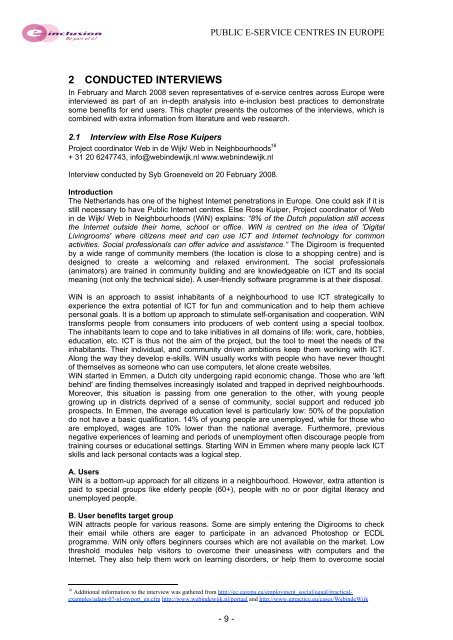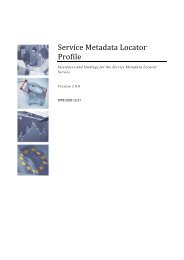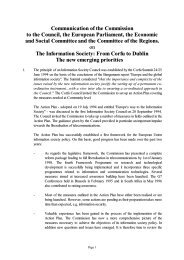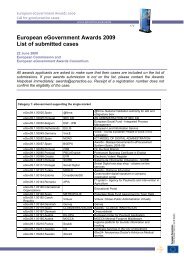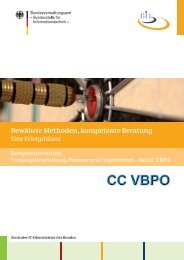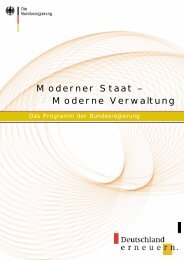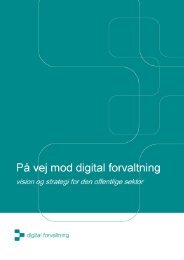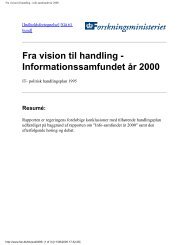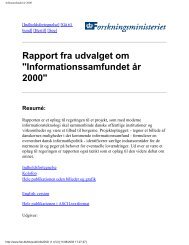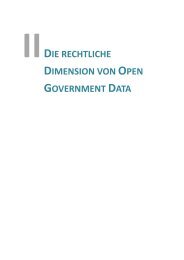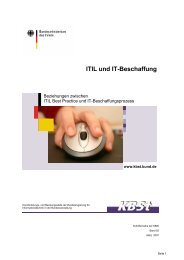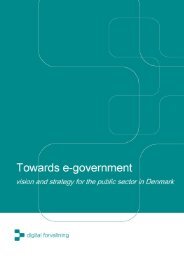Comparative Study of Public e-Service Centres in - ePractice.eu
Comparative Study of Public e-Service Centres in - ePractice.eu
Comparative Study of Public e-Service Centres in - ePractice.eu
You also want an ePaper? Increase the reach of your titles
YUMPU automatically turns print PDFs into web optimized ePapers that Google loves.
2 CONDUCTED INTERVIEWS<br />
PUBLIC E-SERVICE CENTRES IN EUROPE<br />
In February and March 2008 seven representatives <strong>of</strong> e-service centres across Europe were<br />
<strong>in</strong>terviewed as part <strong>of</strong> an <strong>in</strong>-depth analysis <strong>in</strong>to e-<strong>in</strong>clusion best practices to demonstrate<br />
some benefits for end users. This chapter presents the outcomes <strong>of</strong> the <strong>in</strong>terviews, which is<br />
comb<strong>in</strong>ed with extra <strong>in</strong>formation from literature and web research.<br />
2.1 Interview with Else Rose Kuipers<br />
Project coord<strong>in</strong>ator Web <strong>in</strong> de Wijk/ Web <strong>in</strong> Neighbourhoods 16<br />
+ 31 20 6247743, <strong>in</strong>fo@web<strong>in</strong>dewijk.nl www.webn<strong>in</strong>dewijk.nl<br />
Interview conducted by Syb Groeneveld on 20 February 2008.<br />
Introduction<br />
The Netherlands has one <strong>of</strong> the highest Internet penetrations <strong>in</strong> Europe. One could ask if it is<br />
still necessary to have <strong>Public</strong> Internet centres. Else Rose Kuiper, Project coord<strong>in</strong>ator <strong>of</strong> Web<br />
<strong>in</strong> de Wijk/ Web <strong>in</strong> Neighbourhoods (WiN) expla<strong>in</strong>s: “8% <strong>of</strong> the Dutch population still access<br />
the Internet outside their home, school or <strong>of</strong>fice. WiN is centred on the idea <strong>of</strong> 'Digital<br />
Liv<strong>in</strong>grooms' where citizens meet and can use ICT and Internet technology for common<br />
activities. Social pr<strong>of</strong>essionals can <strong>of</strong>fer advice and assistance.” The Digiroom is frequented<br />
by a wide range <strong>of</strong> community members (the location is close to a shopp<strong>in</strong>g centre) and is<br />
designed to create a welcom<strong>in</strong>g and relaxed environment. The social pr<strong>of</strong>essionals<br />
(animators) are tra<strong>in</strong>ed <strong>in</strong> community build<strong>in</strong>g and are knowledgeable on ICT and its social<br />
mean<strong>in</strong>g (not only the technical side). A user-friendly s<strong>of</strong>tware programme is at their disposal.<br />
WiN is an approach to assist <strong>in</strong>habitants <strong>of</strong> a neighbourhood to use ICT strategically to<br />
experience the extra potential <strong>of</strong> ICT for fun and communication and to help them achieve<br />
personal goals. It is a bottom up approach to stimulate self-organisation and cooperation. WiN<br />
transforms people from consumers <strong>in</strong>to producers <strong>of</strong> web content us<strong>in</strong>g a special toolbox.<br />
The <strong>in</strong>habitants learn to cope and to take <strong>in</strong>itiatives <strong>in</strong> all doma<strong>in</strong>s <strong>of</strong> life: work, care, hobbies,<br />
education, etc. ICT is thus not the aim <strong>of</strong> the project, but the tool to meet the needs <strong>of</strong> the<br />
<strong>in</strong>habitants. Their <strong>in</strong>dividual, and community driven ambitions keep them work<strong>in</strong>g with ICT.<br />
Along the way they develop e-skills. WiN usually works with people who have never thought<br />
<strong>of</strong> themselves as someone who can use computers, let alone create websites.<br />
WiN started <strong>in</strong> Emmen, a Dutch city undergo<strong>in</strong>g rapid economic change. Those who are 'left<br />
beh<strong>in</strong>d' are f<strong>in</strong>d<strong>in</strong>g themselves <strong>in</strong>creas<strong>in</strong>gly isolated and trapped <strong>in</strong> deprived neighbourhoods.<br />
Moreover, this situation is pass<strong>in</strong>g from one generation to the other, with young people<br />
grow<strong>in</strong>g up <strong>in</strong> districts deprived <strong>of</strong> a sense <strong>of</strong> community, social support and reduced job<br />
prospects. In Emmen, the average education level is particularly low: 50% <strong>of</strong> the population<br />
do not have a basic qualification. 14% <strong>of</strong> young people are unemployed, while for those who<br />
are employed, wages are 10% lower than the national average. Furthermore, previous<br />
negative experiences <strong>of</strong> learn<strong>in</strong>g and periods <strong>of</strong> unemployment <strong>of</strong>ten discourage people from<br />
tra<strong>in</strong><strong>in</strong>g courses or educational sett<strong>in</strong>gs. Start<strong>in</strong>g WiN <strong>in</strong> Emmen where many people lack ICT<br />
skills and lack personal contacts was a logical step.<br />
A. Users<br />
WiN is a bottom-up approach for all citizens <strong>in</strong> a neighbourhood. However, extra attention is<br />
paid to special groups like elderly people (60+), people with no or poor digital literacy and<br />
unemployed people.<br />
B. User benefits target group<br />
WiN attracts people for various reasons. Some are simply enter<strong>in</strong>g the Digirooms to check<br />
their email while others are eager to participate <strong>in</strong> an advanced Photoshop or ECDL<br />
programme. WiN only <strong>of</strong>fers beg<strong>in</strong>ners courses which are not available on the market. Low<br />
threshold modules help visitors to overcome their uneas<strong>in</strong>ess with computers and the<br />
Internet. They also help them work on learn<strong>in</strong>g disorders, or help them to overcome social<br />
16 Additional <strong>in</strong>formation to the <strong>in</strong>terview was gathered from http://ec.<strong>eu</strong>ropa.<strong>eu</strong>/employment_social/equal/practicalexamples/adapt-07-nl-myport_en.cfm<br />
http://www.web<strong>in</strong>dewijk.nl/portaal and http://www.epractice.<strong>eu</strong>/cases/Web<strong>in</strong>deWijk<br />
- 9 -


